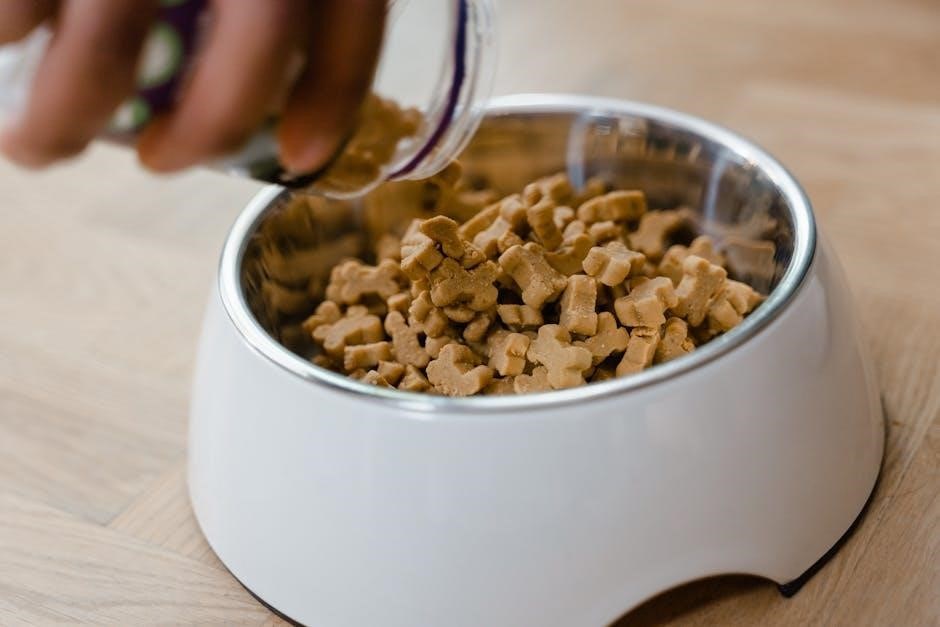Wainwrights Puppy Food Feeding Guide provides essential information for puppy owners, ensuring optimal growth and development through balanced nutrition, tailored to age, breed, and dietary needs.
Overview of Wainwrights Puppy Food
Wainwrights Puppy Food is a well-regarded brand offering high-quality, balanced nutrition for puppies. It provides a range of recipes tailored to different life stages, breeds, and dietary needs. The food is crafted with healthy ingredients, ensuring optimal growth and development. Wainwrights offers both dry and wet food options, allowing owners to choose or combine formats. Their formulas are designed to meet the nutritional requirements of puppies, with high-protein sources and essential vitamins and minerals. The brand also caters to sensitive stomachs with hypoallergenic recipes. Wainwrights Puppy Food is widely recommended for its commitment to quality and tailored feeding solutions, helping owners raise healthy, thriving puppies.
Importance of Proper Feeding for Puppies
Proper feeding is critical for puppies, as it directly impacts their growth, health, and long-term well-being. A well-balanced diet ensures optimal development of muscles, bones, and organs. Poor nutrition can lead to health issues, stunted growth, and increased vulnerability to illnesses. Puppies require high-quality, nutrient-rich food to meet their high energy needs and support rapid development. A balanced intake of protein, carbohydrates, fats, vitamins, and minerals is essential for building a strong immune system and maintaining vitality. Proper feeding habits also help prevent obesity and promote a healthy weight, setting the foundation for a thriving adult life. Consistency and adherence to feeding guidelines are vital for raising a happy, healthy puppy.

Wainwrights Puppy Food Product Range
Wainwrights offers a diverse range of puppy food, including dry kibble, wet trays, and pouches, with flavors like lamb, chicken, and salmon, catering to different dietary needs.
Dry Puppy Food Options
Wainwrights offers a variety of dry puppy food options, crafted with high-quality ingredients to support growth and development. Their dry kibble is available in flavors such as lamb, chicken, and salmon, ensuring diversity in protein sources. These recipes are designed to cater to puppies of different breeds and sizes, with hypoallergenic options for sensitive digestion. The dry food is free from added wheat, making it a suitable choice for puppies with dietary restrictions. Portion sizes vary based on breed and age, with guidelines provided to ensure proper nutrition. Wainwrights dry puppy food is a balanced and nutritious option, promoting healthy growth and energy levels in puppies.
Wet Puppy Food Options
Wainwrights provides a range of wet puppy food options, available in both trays and pouches; Flavors include chicken, turkey, lamb, tuna, and salmon, offering variety and catering to different tastes and dietary needs. Wet food is particularly beneficial for puppies who prefer moist meals or have higher hydration requirements. The trays and pouches are convenient and can be served as standalone meals or mixed with dry food for added flavor and moisture. Wainwrights wet puppy food is made with wholesome ingredients, ensuring puppies receive essential nutrients for healthy growth and development. These options are popular among owners seeking to enhance their puppy’s mealtime experience with palatable and nutritious choices.
Combination Feeding (Dry + Wet)
Combination feeding involves mixing Wainwrights dry and wet puppy food to provide variety, enhance flavor, and ensure hydration. This method is ideal for puppies that prefer moist meals or need extra moisture in their diet. Owners can add wet food trays or pouches to dry kibble, creating a balanced and nutritious meal. The wet food adds palatability, while the dry food supports dental health. Portion sizes should be adjusted to avoid overfeeding, ensuring the total daily intake aligns with the recommended guidelines. This approach allows flexibility and can be tailored to meet individual puppy needs, promoting overall health and satisfaction.

Feeding Schedule for Puppies
Feeding schedules for puppies vary by age and breed, adjusting portions as they grow. Combining wet and dry food can aid hydration and satisfy appetite.
Monitor growth and adjust portions accordingly for a healthy, balanced diet.
Feeding by Age: 8-12 Weeks
At 8-12 weeks, puppies transition from weaning to solid food. Feed 3-4 small meals daily to support rapid growth. Start with a mix of wet and dry food for hydration and flavor.
For dry food, begin with 50-100g per meal, adjusting as the puppy grows. Wet food can be introduced gradually, using 1/4 to 1/2 of a tray per meal.
Monitor weight and energy levels to ensure portions are adequate. Avoid overfeeding to prevent obesity. Gradually increase portions as the puppy becomes more active.
Always consult the feeding guide or a vet for personalized advice.
Feeding by Age: 3-4 Months
At 3-4 months, puppies require consistent, nutrient-rich meals to support rapid growth. Feed 3-4 times daily, with portions increasing slightly.
For dry food, start with 100-150g per meal, adjusting based on breed and activity. Wet food can be added (1/2 to 3/4 of a tray per meal) for hydration.
Monitor weight and adjust portions to avoid overfeeding. Transitioning to adult portions gradually is key.
Combine wet and dry food if needed, ensuring meals are balanced. Always follow the feeding guide or consult a vet for tailored advice.
Feeding by Age: 6-12 Months
Between 6-12 months, puppies transition toward adult feeding habits. Feed 2-3 meals daily, with portions gradually increasing.
For dry food, aim for 200-300g per meal, adjusting for breed size and activity. Wet food can supplement with 1-2 trays daily.
Large breeds may require up to 470g of dry food, while smaller breeds need less. Monitor growth and adjust portions to prevent overfeeding.
Combine wet and dry food for hydration and variety. Transition to adult portions slowly to avoid digestive issues. Ensure a balanced diet aligned with developmental needs. Always consult the feeding guide or a vet for personalized advice.

Breed-Specific Feeding Guidelines
Feeding amounts vary based on breed size and activity levels. Toy breeds (up to 5kg) require 1-2 trays daily, while larger breeds may need 4-5.5 trays.
Toy Breeds (Up to 5kg)
Toy breeds require precise feeding to avoid overfeeding. Wainwrights recommends 1 1/4 to 2 1/4 trays daily for small breeds. Monitor portion sizes closely, as toy breeds have high metabolisms but small stomachs. Divide meals into 3-4 smaller portions to prevent overeating. Ensure access to fresh water to maintain hydration. Avoid free-feeding, as it can lead to weight gain. Combining wet and dry food can help manage appetite and provide balanced nutrition. Adjust portions based on individual puppy activity levels and growth patterns. Always consult the feeding guide or a veterinarian for tailored advice to ensure optimal health and development. Proper feeding habits early on set the foundation for a healthy adulthood.
Small Breeds (5-12kg)
For small breeds weighing 5-12kg, Wainwrights feeding guide suggests 1 1/4 to 2 1/4 trays per day. Divide meals into 3-4 portions to manage digestion and energy levels. Wet and dry food combinations are ideal, ensuring hydration and nutrient balance. Monitor growth and adjust portions as needed, especially during rapid development phases. Avoid overfeeding to prevent obesity, a common issue in small breeds. Fresh water should always be available. Tailor feeding schedules based on activity levels and individual needs. Consulting a vet can provide personalized recommendations, ensuring the best start for a healthy, active life. Consistency is key to supporting their growth and overall well-being. Adjustments may be necessary as they approach adulthood.
Medium Breeds (12-25kg)
For medium breeds (12-25kg), Wainwrights feeding guidelines recommend 270-470g of dry food per day, divided into 3 meals for optimal digestion and energy balance. Wet food can be added, with 1-2 trays per day. Monitor growth and adjust portions to prevent overfeeding. Ensure fresh water is always available. Avoid obesity by maintaining a balanced diet. Tailor feeding schedules to activity levels, and consult a vet for personalized advice. Consistency in feeding supports steady growth and overall health. Adjustments may be needed as puppies transition to adulthood. Regular checks ensure the best outcomes for medium-breed puppies. Always prioritize quality and freshness in their meals.
Large Breeds (25-45kg)
Large breeds (25-45kg) require a tailored feeding approach to support their growth. Wainwrights recommends 430-470g of dry food daily, divided into 3 meals. Wet food can be added, with 4-5 trays per day for optimal hydration and taste. Monitor growth closely to avoid joint strain from rapid weight gain. Adjust portions based on activity levels and consult a vet for specific needs. Ensure a balanced diet with high-quality ingredients to promote healthy development. Regular feeding schedule adjustments are crucial to prevent overfeeding and support a smooth transition to adulthood. Fresh water should always be available to maintain hydration. Tailor feeding plans to individual puppy needs for the best health outcomes.
Giant Breeds (Over 45kg)
For giant breeds (over 45kg), Wainwrights recommends a tailored feeding plan to support their significant growth. Wet food trays suggest 395-790g daily, while dry food portions should be adjusted based on age and activity. Divide meals into 3-4 portions to prevent overeating and joint strain. Monitor weight gain closely to avoid excessive growth rates. Combining wet and dry food can enhance hydration and satisfaction. Ensure high-quality protein sources and balanced nutrients for optimal health. Regular vet check-ups are crucial to adjust feeding plans. Tailor portions to individual needs, as giant breeds often require more calories but may benefit from slower growth rates for joint health. Always prioritize fresh water availability.

Wet Food Feeding Guidelines
Wainwrights wet puppy food offers trays or pouches, providing essential moisture and flavor. Follow portion sizes for your puppy’s breed and age, mixing with dry food if desired for hydration and variety. Wet food can be served as a topper or a full meal, ensuring your puppy stays hydrated and satisfied. Always introduce wet food gradually to prevent digestive upset. Consult the feeding chart for specific recommendations tailored to your puppy’s needs. Wet food is a great way to add variety and keep meals interesting while maintaining balanced nutrition. Adjust portions as your puppy grows and thrives. Fresh water should always be available to complement wet food intake, ensuring overall hydration and health. Consult the feeding guide for exact amounts based on weight and age to avoid overfeeding or underfeeding. Wet food can be a nutritious and delicious addition to your puppy’s diet when fed correctly.
Feeding Trays
Wainwrights wet puppy food trays offer a convenient and nutritious meal option for puppies. Each tray is portion-controlled, making it easy to follow the feeding guidelines based on your puppy’s size and age. For small breeds, 1 1/4 to 2 1/4 trays per day are recommended, while larger breeds may require up to 4 to 5 1/2 trays daily. Trays can be served as a standalone meal or mixed with dry food for added variety. Made with high-quality ingredients like lamb, rice, and superfoods, they provide essential moisture and flavor. Always introduce trays gradually to prevent digestive upset and ensure fresh water is available. Adjust portions as your puppy grows to maintain a healthy weight and meet their nutritional needs.
Feeding Pouches
Wainwrights puppy food pouches are a versatile and tasty addition to your puppy’s diet, offering a variety of flavors like Chicken with Rice and Salmon with Superfoods. Pouches are ideal for adding moisture or as a topper for dry food. For small breeds, 1-2 pouches per day are recommended, while larger breeds may require up to 3-4 pouches. They provide essential nutrients and come in convenient, pre-portioned sizes. Pouches are suitable for puppies up to 45kg, making them a great option for smaller and medium-sized breeds. Always refrigerate after opening and ensure fresh water is available to keep your puppy hydrated and healthy.
How to Introduce Wet Food
Introducing wet food to your puppy’s diet should be done gradually to prevent digestive upset. Start by mixing a small amount of Wainwrights wet food with their dry kibble, ensuring a smooth transition. For the first few days, use a quarter of a wet food tray or pouch alongside their usual dry food. Gradually increase the proportion of wet food over 7-10 days until you reach the desired mix. This method helps your puppy adapt to the new texture and flavors, maintaining their appetite and avoiding stomach issues. Always use fresh, high-quality wet food and consult your vet if any adverse reactions occur during the transition period.

Dry Food Feeding Guidelines
Tailor portion sizes to your puppy’s age, breed, and activity level. Use the feeding chart as a guide and adjust gradually to support healthy growth and energy levels.
Portion Sizes for Different Breeds
Portion sizes vary significantly based on breed size. Toy breeds (up to 5kg) require smaller amounts, typically 1/4 to 1/2 cups per day. Small breeds (5-12kg) need 1/2 to 1 cup daily. Medium breeds (12-25kg) should receive 1 to 1.5 cups, while large breeds (25-45kg) require 1.5 to 2 cups. Giant breeds (over 45kg) need 2 to 2.5 cups. Adjustments may be necessary based on individual puppy activity levels and growth progress. Always consult the feeding chart and monitor your puppy’s weight to ensure optimal nutrition without overfeeding. Gradual changes are recommended to prevent digestive upset.
How to Transition to Dry Food
Transitioning your puppy to dry food should be done gradually to prevent digestive upset. Start by mixing a small amount of dry food with their current wet food, beginning with a 25% dry and 75% wet ratio. Over 7-10 days, increase the dry food proportion by 10% every few days until reaching 100% dry food. To make it more appealing, you can slightly dampen the dry food with water initially. Monitor your puppy for any signs of digestive discomfort and adjust the transition pace if needed. Maintain the usual feeding schedule and consult Wainwrights guidelines for specific recommendations to ensure a smooth and healthy transition for your puppy.

Nutritional Needs of Puppies
Puppies require high-quality protein, healthy fats, and essential vitamins and minerals to support growth and energy. Wainwrights formulas are tailored to meet these needs effectively.
Protein Requirements
Puppies require high-quality protein to support rapid growth and muscle development. Wainwrights puppy food uses ingredients like lamb, chicken, and fish to provide essential amino acids. Protein-rich recipes help build strong muscles and energy levels. The food is formulated to meet the nutritional standards set by the Association of American Feed Control Officials (AAFCO), ensuring puppies receive the right amount of protein for optimal health. Adequate protein intake is crucial during the first year of life, as it supports overall development and prepares puppies for a healthy adulthood. Wainwrights balances protein with other nutrients to create a comprehensive diet tailored to puppies’ needs.
Carbohydrates and Energy
Carbohydrates play a vital role in providing energy for puppies, supporting their active lifestyles and growth. Wainwrights puppy food incorporates high-quality sources like rice, maize, and barley, which are easily digestible and offer sustained energy. These complex carbs help fuel playful activities and support overall development. The balanced inclusion of carbohydrates ensures puppies maintain energy levels without overwhelming their systems. Additionally, the combination of carbohydrates with protein and fats creates a well-rounded diet that supports healthy growth and vitality; Wainwrights carefully proportions these ingredients to meet the energetic needs of puppies, ensuring they thrive during their critical developmental stages.
Fats and Omega Fatty Acids
Fats and omega fatty acids are crucial for a puppy’s health, providing essential energy and supporting skin, coat, and brain development. Wainwrights puppy food includes sources like rapeseed oil and fish oils, which are rich in omega-3 and omega-6 fatty acids. These nutrients promote healthy skin, a shiny coat, and support cognitive development. Balanced fat content ensures puppies receive the energy they need for growth and play, while maintaining overall health. Wainwrights carefully selects these ingredients to meet the nutritional demands of growing puppies, ensuring they thrive physically and mentally.
Vitamins and Minerals
Vitamins and minerals are vital for puppies, supporting immune function, bone health, and overall development. Wainwrights puppy food is fortified with essential vitamins like A, D, and E, alongside minerals such as calcium and phosphorus. These nutrients help build strong bones and teeth, while also supporting immune systems and energy metabolism. Wainwrights ensures that each recipe meets the nutritional standards set by regulatory bodies, providing a balanced mix that promotes healthy growth and prevents deficiencies. By incorporating these vital components, Wainwrights helps puppies develop into strong, healthy adults with optimal vitality and well-being.

Hydration and Feeding
Hydration is crucial for puppies, supporting digestion and overall health. Combining wet and dry food can enhance moisture intake, ensuring proper hydration levels for optimal growth.
Ensuring Adequate Water Intake
Ensuring adequate water intake is vital for puppies, as it aids digestion, prevents dehydration, and supports overall health. Always provide fresh water alongside Wainwrights puppy food. Wet food can contribute to hydration, but it shouldn’t replace water. Monitor water bowls to ensure they’re clean and accessible. Puppies, especially during growth spurts, may need more water. Signs of dehydration include dry mouth and reduced energy. If concerned, consult your vet. Proper hydration, combined with balanced nutrition, helps puppies thrive and transition smoothly into adulthood.
Combining Wet and Dry Food for Hydration
Combining wet and dry Wainwrights puppy food can enhance hydration, especially for puppies who may not drink enough water. Wet food contains higher moisture, which helps maintain proper hydration levels. Start by mixing a small portion of wet food with dry kibble to create a palatable meal. Gradually adjust the ratio based on your puppy’s preference and needs. This method ensures they receive essential nutrients while staying hydrated. Always monitor their water intake and adjust the combination as they grow. This approach supports healthy digestion and overall well-being, making mealtime both nutritious and enjoyable for your puppy.

Monitoring and Adjusting
Regularly track your puppy’s growth, adjusting portions as needed. Monitor weight and health, ensuring the food meets their developmental needs.
How to Monitor Puppy Growth
Regularly weigh your puppy and observe body condition to ensure proper development. Track progress through developmental milestones, such as teething, coat health, and energy levels; Monitor feeding behavior, ensuring interest in meals and stool quality remains consistent. Adjust portions based on growth spurts and activity levels. Consult your veterinarian to confirm healthy growth patterns and address any concerns promptly. Consistent monitoring helps tailor feeding schedules to meet your puppy’s evolving needs, promoting a strong foundation for adult life.
Adjusting Portions as Puppies Grow
As puppies grow, their food portions need adjustment to match their developmental stage and energy levels. Regularly weigh your puppy and assess body condition to ensure they are not underweight or overweight. Puppies typically require more food during growth spurts, such as between 3-6 months. Adjust portions gradually, following the feeding guide or consulting your veterinarian. For example, a 10-week-old puppy may need smaller, frequent meals, while a 6-month-old puppy can transition to fewer, larger portions. Monitor activity levels and adjust accordingly, as more active puppies may require additional calories. Tailoring portions ensures optimal growth and prevents overfeeding or underfeeding.
Wainwrights Puppy Food Feeding Guide offers tailored nutrition for healthy growth, ensuring puppies thrive with balanced meals and proper hydration, supporting their journey to adulthood.
Final Tips for Feeding Your Puppy
When feeding your puppy, consistency is key. Stick to a routine and gradually transition between food types to prevent digestive issues. Always ensure fresh water is available. Monitor your puppy’s weight and adjust portions as needed. For combination feeding, balance wet and dry food according to the Wainwrights feeding guide. Avoid overfeeding to prevent obesity. Consult your vet if you notice any health changes. High-quality ingredients in Wainwrights support healthy growth, so trust the formula but tailor it to your puppy’s unique needs. Remember, every puppy is different, so observe and adapt their diet accordingly for optimal health.

Ensuring a Healthy Transition to Adulthood
A smooth transition from puppy to adult food is crucial for long-term health. Gradually introduce adult food around 12-18 months, aligning with your puppy’s breed and size. Monitor weight and adjust portions to prevent overfeeding. Tailor the diet to your puppy’s growth rate, ensuring high-quality protein for muscle development and essential vitamins for overall well-being. Regular vet check-ups can confirm if the transition is on track. A balanced diet during this phase sets the foundation for a healthy, energetic adulthood. Trust Wainwrights’ nutrient-rich formulas to support this critical life stage, ensuring your puppy thrives into a strong, vibrant adult dog.



